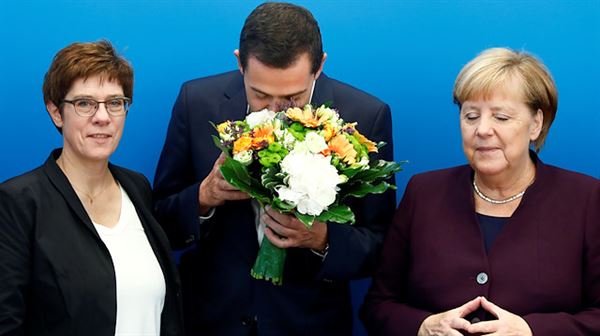German conservative leader Annegret Kramp-Karrenbauer on Monday faced a rebellion by party members angry at a humiliating election result in eastern T
German conservative leader Annegret Kramp-Karrenbauer on Monday faced a rebellion by party members angry at a humiliating election result in eastern Thuringia state where the Christian Democrats (CDU) lost voters to both the far-left and far-right.
Discontent within the CDU grew louder after their fourth setback at the ballot box this year under Kramp-Karrenbauer, who has countered mounting doubts about her suitability to lead the conservatives in the next federal election in 2021 since she became chairwoman in December.
The CDU dropped from first to third place in Thuringia, falling behind the far-right Alternative for Germany (AfD) in second and the far-left Linke party, which came out first with just over 30% of the vote.
The inconclusive election has put the onus on the CDU to ditch its long-established policy of ostracising the Linke, which conservative leaders deem the reincarnation of the Communist party that ruled East Germany until 30 years ago.
Thuringia’s Linke-led coalition with the centre-left Social Democrats (SPD) and the Greens lacks a majority to continue governing and needs the CDU on board for a stable coalition. All parties refuse to work with the AfD, which they accuse of racist rhetoric against Muslim migrants.
Mike Mohring, CDU leader in Thuringia, led the charge against his party’s position, saying it was up to him, and not Chancellor Angela Merkel or Kramp-Karrenbauer, to decide on a policy reversal that opens the door for a possible coalition with the Linke.
“I do not rule out talks with those who respect our constitution and want to build Thuringia with us,” Mohring told public broadcaster MDR. “I do not need Berlin for the question of how we can take responsibility for the sake of our state.”
Ingo Senftleben, former CDU leader in Brandenburg who resigned last month after his party fell to third place in a regional election, was more direct.
‘AKKATASTROPHE’
“People don’t want ideological trenches and that’s why the Linke and CDU should be able to hold talks,” he told the Handelsblatt business daily.
He added that the CDU should not block the will of the people. A poll published after the election in Thuringia on Sunday showed that more than 70% of CDU voters in the eastern state want their party to join a Linke-led coalition.
Kramp-Karrenbauer, known as AKK, has been weakened by gaffes and a perception among voters and a large section of the CDU that she is a continuation of Merkel’s centrist path.
Her authority has been further eroded by her failure to revive the conservatives’ fortunes at the ballot box. The party suffered painful losses at the European Parliament elections in May and three elections in eastern German regions.
The election in Thuringia exposed deep polarisation among German voters. The Linke and AfD together won more than half of the vote, leaving the CDU, the centre-left SPD, the Greens and the liberal Free Democrats with no majority.
Mass-selling Bild newspaper blamed this polarisation on Merkel’s and Kramp-Karrenbauer’s centrist political path, which makes it difficult for voters to distinguish between the mainstream parties and pushes them to extremes.
“Merkel’s strategy of absolute open-mindedness for the sake of colourful coalitions as well as her tactic of adopting policies from the Greens and the Social Democrats has failed,” Bild wrote.
“Angela Merkel and CDU leader Annegret Kramp-Karrenbauer could share a prize for causing the (voter) exodus that brought us here. AKKatastrophe!”
